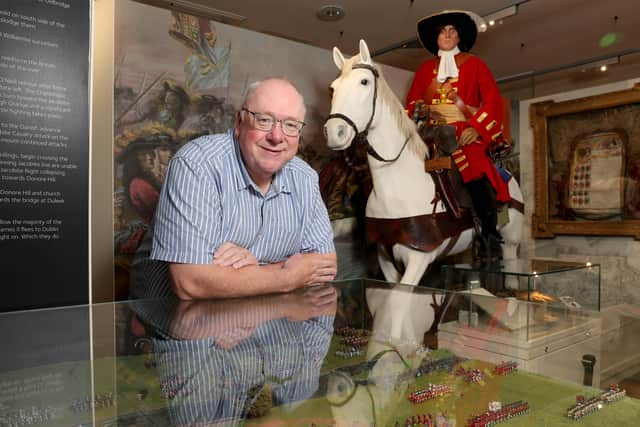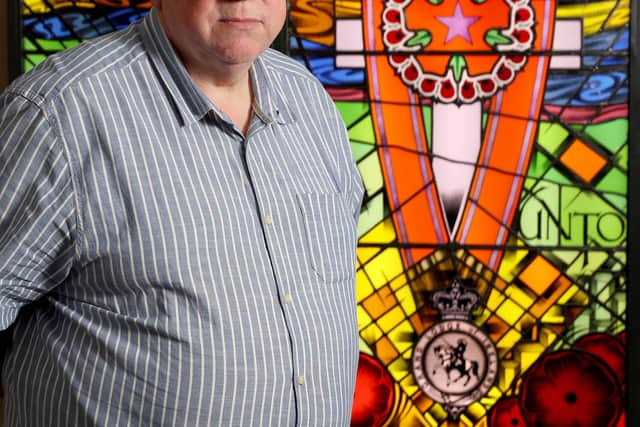Orange Order leader: For the Union’s survival, I may have to accept a changed Northern Ireland – and I will
and live on Freeview channel 276
It is not as simple as leader and follower because those being led will only consent to that leadership within certain parameters. And yet great leaders are able to inspire, cajole and even kindle unknown desires in those they lead.
Within the Orange Order, a deeply democratic organisation suffused with the ‘protest’ part of Protestantism, leadership is especially tricky – and all the more so because of the order’s unresolved tension between being a religious, cultural or political body.
Advertisement
Hide AdAdvertisement
Hide AdFor more than a decade until his sudden death at the age of 60 in 2016, the Order’s key strategic thinker was Grand Secretary Drew Nelson.


A modernising figure who saw the need for change while still valuing its traditions and representing its conservative values, the Dromore solicitor took the Orange message to the Oireachtas and helped steer the institution away from battles over a handful of contentious parades which it had been losing.
Sitting in Schomberg House, the order’s headquarters which now houses an impressive modern museum of Orange heritage which Mr Nelson was instrumental in developing, I ask his successor as Grand Master if it was inevitable that the reforms introduced during his tenure would survive Mr Nelson.
The Rev Mervyn Gibson is wary of ascribing too much solely to Mr Nelson, saying that “you couldn’t be a one man band in the order and go a certain road; you need to bring the institution with you and Drew was adept at bringing the institution with him are knowing when changes should come in, and should not come in. He picked his battles.”
Advertisement
Hide AdAdvertisement
Hide AdHe describes the order as slow to move – “like an oil tanker” – but an organisation which with in the years after the end of the Troubles came to realise that “the world had changed”.


Running through a lengthy interview with the News Letter is a sense of far deeper pragmatism than the order’s public image suggests – although in an organisation where power flows upwards from each lodge, the views of its leadership are no guarantee as to its future direction.
The Order is grappling with its changing role in a changing Northern Ireland and a loss of influence symbolised by the fact that every leader of unionism up until Peter Robinson had been an Orangeman (Ian Paisley had left the Orange to join the Independent Orange Order) but now none of the three unionist leaders are members of the order.
The 62-year-old Presbyterian minister and former RUC officer says that the order “accept where we are now – we can’t live battles that were fought 300 years ago, or 100 years ago, or 10 years ago”.
Advertisement
Hide AdAdvertisement
Hide AdHe says that the order needs to “make a stand for things” in which it believes, but also accept “the reality of what power base we have, what influence we have, because all of a sudden you could become an organisation of one, standing on your own shouting”.
The order is currently focussed on finalising a programme of events to mark the centenary of Northern Ireland’s creation next year.
When asked if the price of maintaining the Union well into the next century in the face of cultural and demographic change will be a very different sort of Northern Ireland, he says: “I don’t think anything stays the same. Northern Ireland in 50 years time will be different from 50 years ago.
“I believe Northern Ireland will still be in existence...I may have to adapt to certain things; I may have to change an attitude to certain things; I may have to accept more things – but ultimately I’m up for that challenge; I’m up for those discussions”.
Advertisement
Hide AdAdvertisement
Hide AdBut while the Rev Gibson has personally taken part in meetings with Sinn Féin in the past – something the Order still rejects and which with theological hair-splitting he does not do in his Orange capacity – he says that it is disrespectful to unionists to invite them to discussions centred on an assumption that a united Ireland is inevitable.
While leading an organisation only open to Protestants, he accepts that the future will be decided by those who “won’t be necessarily cultural unionists, for want of a better description, or born unionists – so we have to make sure that we don’t alienate [them] by our actions and by what we do.”But equally we are who we are; we’ll continue to parade and celebrate what we do.
“But we have to understand that it isn’t 100 years ago where the Orange was the backbone of unionism and whatever we did everyone fell into line with that – that’s no longer the case”.
He adds: “We are a significant influencer in this community for the Union, but we’re not the only influence”.
Advertisement
Hide AdAdvertisement
Hide AdWhere just a few years ago the Orange was attempting to engineer a single unionist party, the Rev Gibson now believes that would be a mistake.
“My opinion has changed over the years as I’ve mellowed...I’ve been active in many things for unionist unity over the years. My ideal would have been one unionist party. A few years ago I came to the conclusion that that is not a good thing – people need a choice because unionists can be liberal, Labour or Conservative so they need a range of parties to be able to vote for.
“And secondly, practically it was never going to happen when you talked to the unionist leaders....but I do believe there can be unionist cooperation”. He says that “sadly sometimes the first thing unionists do is look for the Lundy in the room or look for the boy that’s not as strong a unionist as they are. I think we’ve to get over ourselves on that one”.
The Rev Gibson voted for Brexit – mainly on the issue of sovereignty – and he says he would probably vote the same way today, stressing that it was a personal decision and the Order took no stance on the issue.
Advertisement
Hide AdAdvertisement
Hide AdDoes that mean that regaining power from Brussels is more important to him than the Irish Sea border? “I want to see what the Irish Sea border looks like,” he says in response.
“There are all sorts of promises. I’ll be quite open – we’ve met the Secretary of State several times within the last two to three weeks and we’re assured that it’s going to be no Irish Sea border in the sense of any goods coming into Northern Ireland will face no restrictions – other than the agri-food industry, which are natural checks – but equally if the goods are coming in for onward transmission to the Republic then there has to be paperwork and that will be done at source in England and it will be as frictionless as possible.”
He adds: “I want to see how this works out because there seem to be a lot of opinions around this – and I’m taking people at their word.”
Does he trust the government, given what they’ve done before in this area? “You could say not, but what else do we do? Do we start complaining and protesting and jumping up and down...about something that hasn’t happened when you’re being told by someone that this is the way it’s going to be...Do I trust them? No, if the truth be told. But I want to trust them.”
Varadkar’s visit ‘the pinnacle’ of Orange-Dublin relations
Advertisement
Hide AdAdvertisement
Hide AdToiseach Leo Varadkar’s 2018 visit to the Orange Order’s east Belfast headquarters was a “very significant” moment for the institution, Mervyn Gibson says.
On a warm June day, the then Irish leader was greeted at Schomberg House by Grand Master Edward Stevenson and paid his respects at the stained glass memorial to the 336 Orangemen and women murdered during the Troubles.
The Rev Gibson says it was “the pinnacle” of improved relations between the Orange and the Irish government.
He says that the Republic’s legal claim on Northern Ireland and its role in either assisting the IRA or in refusing to extradite terrorists for trial had long angered the order’s members and that for a long time the two sides had viewed each other as “the enemy”.
Advertisement
Hide AdAdvertisement
Hide AdHe accepts that in the 1960s it was the order which had resisted moves to improve relations but says: “I think time has healed relationships with the south. I think the McAleeses did a great job and worked behind the scenes in building relations.”
He says it was easier for the Orange to welcome Mr Varadkar because he “didn’t have the same baggage”, being “from a new generation” and says it was “a bit of a gamble too because we didn’t know how our membership [would react] – again, it’s leadership and the leadership took the decision ‘we’ll welcome him’.”
He says that it went “extremely well” and “we hope to build a similar relationship with Micheal Martin”.
——— ———
A message from the Editor:
Thank you for reading this story on our website. While I have your attention, I also have an important request to make of you.
Advertisement
Hide AdAdvertisement
Hide AdWith the coronavirus lockdown having a major impact on many of our advertisers — and consequently the revenue we receive — we are more reliant than ever on you taking out a digital subscription.
Subscribe to newsletter.co.uk and enjoy unlimited access to the best Northern Ireland and UK news and information online and on our app. With a digital subscription, you can read more than 5 articles, see fewer ads, enjoy faster load times, and get access to exclusive newsletters and content. Visit https://www.newsletter.co.uk/subscriptions now to sign up.
Our journalism costs money and we rely on advertising, print and digital revenues to help to support them. By supporting us, we are able to support you in providing trusted, fact-checked content for this website.
Alistair Bushe
Editor